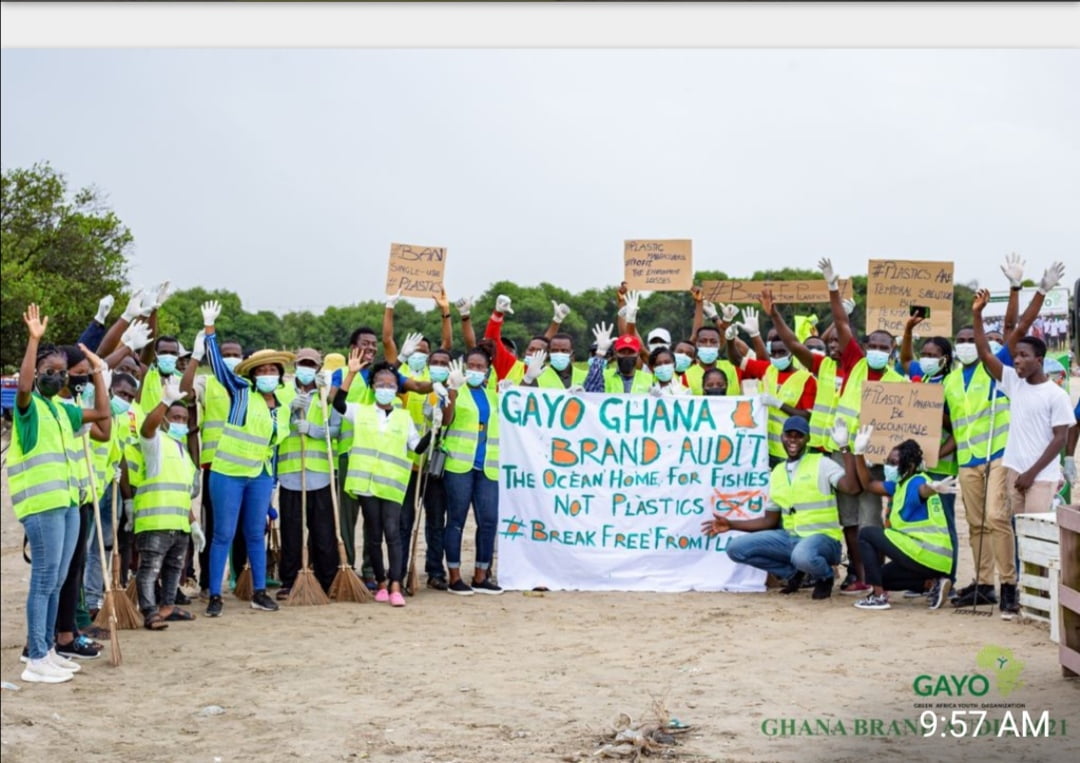GAYO partner Human Rights Reporters Ghana et al. to rid Labadi Beach of plastic wastes

The Green Africa Youth Organization (GAYO) with support of nine (9) other Civil Society Organisations in the country have embarked on a clean-up exercise to rid the Labadi beach located in Accra, the capital city of filth.
The momentous event took place last Saturday, September 18, on a day set aside globally to commemorate the World Cleanup Day.
This was out of a move intended to mark this year’s World Cleanup Day which equally emanated from an initiative dubbed, “GAYO Ghana Brand Audit 2021″, which brought together hundreds of youths to the shores of the Atlantic Ocean who engaged in a thorough clean-up of the beach to rid it of plastic pollutants and debris.
The exercise which was conducted on the theme: “The Ocean Home for Fishes, Not Plastics” also witnessed the participants engaged in plastic waste sorting and auditing to ascertain the largest brand polluter and make recommendations to remedy the situation as part of the global break free from plastic campaign.
The partnering Civil Society Organizations include La Dade Kotopon Municipal, Human Rights Reporters Ghana (HRRG), Young Reporters for the Environmental Ghana – YRE – Ghana, Ghana Youth Environment Movement – GYEM, United Youth Initiative Africa, Sesa Recycling, Nexd’Or, Let’s do it Ghana, McGharbins Network and Youth Climate Council (YCC).
As part of the activities, the public was also educated on how to avoid, reduce, repurpose and divert waste from the oceans and dams for income generation.
The Co-founder and programs manager of GAYO, Mr. Desmond Alugnoa said the brand audit is aimed at naming and shaming the largest polluters of the planet.
Mr. Alugnoa who doubles as the coordinator for the African Member Support Program under the Global Alliance for Incinerator Alternatives (GAIA) said GAYO is against single-use plastics, adding, “we do not need single-use plastic and we cannot live with single-use plastic”.
“People should stop portraying that waste as a form of single-use plastic is a resource, it’s not a resource from start to finish”, he emphasized.
He called on African state leaders to be bold and adopt alternatives to single-use plastics.
“There are alternatives that can switch single-use plastics…if you are a leader you need to be unafraid, you need to not feel threatened by activities that would promote your country…It does not matter who is behind these brands, it does not matter how big the companies are, as a President or a leader you have to take the bull by the horn- which is, allow the alternatives to exist and promote those alternatives because those alternatives are largely led by the youth and informal waste sectors to create more jobs for your economy.”
He noted that some of the collected plastics would be converted to products that are of market value such as raincoats, bags and pens to bring revenue to homes and communities.
A representative of the La Dade Kotopon Municipal Assembly (LADMA) – the host municipality, Mr. Francis Lawrence Tetteh was elated about the initiative and called on community members as well as beach users to avoid polluting the ocean and practice proper waste management beginning from their homes.
Mr. Tetteh assured the public of the assemblies’ efforts to reduce the amount of waste entering the ocean and noted that persons caught in willful pollution of the ocean would be made to face the full rigorous of the law to serve as a deterrent to others.
The Executive of Human Rights Reporters Ghana (HRRG), Mr. Joseph Kobla Wemakor in a telephone interview lauded GAYO for the swift initiative which he alluded to as a solution to one of the greatest problems the country is faced with.
He charged all and sundry to join the campaign and even become ambassadors, to see it work to achieve its objectives and above all a lasting solution
The participants expressed joy at the success of the event and called for a collective effort to protect the environment while equally appealing to the duty-bearers and policymakers to step in and help address the issue of single-use plastics urgently.
Source:Alexander Bombande

 Good Grow: The Marijuana Farm Founded by Akufo-Addo’s Daughters
Good Grow: The Marijuana Farm Founded by Akufo-Addo’s Daughters  National Food Suppliers for Free SHS set to picket at Education Ministry
National Food Suppliers for Free SHS set to picket at Education Ministry  Information Ministry justifies ¢151k paid to staff as Covid-19 risk allowance
Information Ministry justifies ¢151k paid to staff as Covid-19 risk allowance  I’ll help farmers with tractors to increase productivity – Bawumia promises
I’ll help farmers with tractors to increase productivity – Bawumia promises  CETAG meets national teaching council to conclude on strike
CETAG meets national teaching council to conclude on strike  Adom Kyei Duah cannot be the Jesus that Christians seek – Christian Council of Ghana
Adom Kyei Duah cannot be the Jesus that Christians seek – Christian Council of Ghana  Bawumia’s smartphone pledge misguided and visionless – Adongo
Bawumia’s smartphone pledge misguided and visionless – Adongo